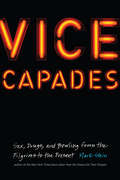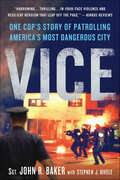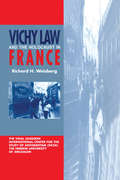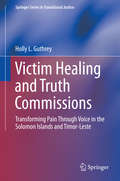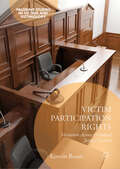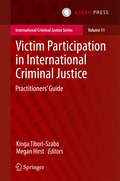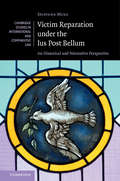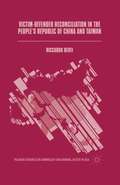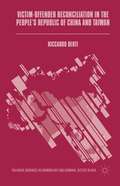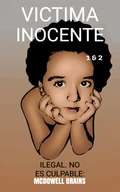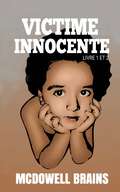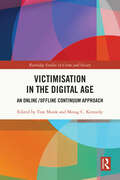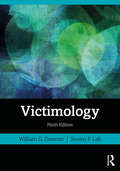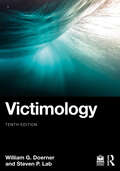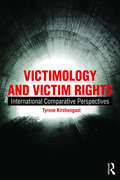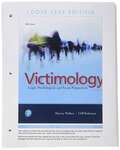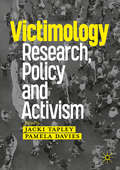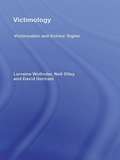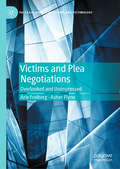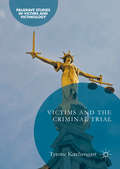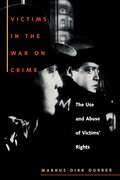- Table View
- List View
Vice & Virtue in Everyday Life: Introductory Readings in Ethics
by Christina Hoff Sommers Fred SommersA comprehensive and provocative collection of both classical and contemporary voices in perennial ethical debates, Vice and Virtue has established itself as one of the truly outstanding anthologies for Introduction to Ethics Courses.
Vice Capades: Sex, Drugs, and Bowling from the Pilgrims to the Present
by Mark SteinFrom outlawing bowling in colonial America to regulating violent video games and synthetic drugs today, Mark Stein’s Vice Capades examines the nation’s relationship with the actions, attitudes, and antics that have defined morality. This humorous and quirky history reveals that our views of vice are formed not merely by morals but by power. While laws against nude dancing have become less restrictive, laws restricting sexual harassment have been enacted. While marijuana is no longer illegal everywhere, restrictive laws have been enacted against cigarettes. Stein examines this nation’s inconsistent moral compass and how the powers-that-be in each era determine what is or is not deemed a vice. From the Puritans who founded Massachusetts with unyielding, biblically based laws to those modern purveyors of morality who currently campaign against video game violence, Vice Capades looks at the American history we all know from a fresh and exciting perspective and shows how vice has shaped our nation, sometimes without us even knowing it.
Vice: One Cop's Story of Patrolling America's Most Dangerous City
by Stephen J. Rivele John R. Baker9 square miles. 10,000 criminals. 130 cops. A riveting memoir by Baker, California's most-decorated police officer Compton: the most violent and crime-ridden city in America. What had been a semi-rural suburb of Los Angeles in the 1950s became a battleground for the Black Panthers and Malcolm X Foundation, the home of the Crips and Bloods and the first Hispanic gangs, and the cradle of gangster rap. At the center of it, trying to maintain order was the Compton Police Department, never more than 130-strong, and facing an army of criminals that numbered over 10,000. At any given time, fully one-tenth of Compton's population was in prison, yet this tidal wave of crime was held back by the thinnest line of the law—the Compton Police. John R. Baker was raised in Compton, eventually becoming the city's most decorated officer involved in some of its most notorious, horrifying and scandalous criminal cases. Baker's account of Compton from 1950 to 2001 is one of the most powerful and compelling cop memoirs ever written—an intensely human account of sacrifice and public service, and the price the men and women of the Compton Police Department paid to preserve their city.
Vichy Law and the Holocaust in France (Studies In Antisemitism Ser. #Vol. 3.)
by Richard H. WeisbergThe involvement of Vichy France with Nazi Germany's anti-Jewish policy has long been a source of debate and contention. At a time when France, after decades of denial, has finally acknowledged responsibility for its role in the deportation and murder of 75,000 Jews from France during the Holocaust, Richard H. Weisberg here provides us with a comprehensive and devastating account of the French legal system's complicity with its German occupiers during the dark period known as 'Vichy'.As in Germany, the exclusionary laws passed during the Vichy period normalized institutional antisemitism. Anti-Jewish laws entered the legal canon with little resistance, and private lawyers quickly absorbed the discourse of exclusion into the conventional legal framework, expanding the laws beyond their simple intentions, their literal sense, and even their German precedents.Drawing on newly-available archival sources, personal interviews, and historical research, Weisberg reveals how legalized persecution actually operated on a practical level, often exceeding German expectations. Further, he presents a persuasive argument for Vichy law as an acquired Catholic response to a flase notion of Jewish Talmudism. The book also compares Vichy experience to American legal precedents and practices and opens up the possibility that postmodern modes of thinking ironically adopt the complexity of Vichy reasoning to a host of reading and thinking strategies.Vichy Law and the Holocaust in France raises fundamental and disturbing questions about the ease with which democratic legal systems can be subverted.
Victim Advocacy before the International Criminal Court
by Elizabeth King Rianne Letschert Sam Garkawe Erin PobjieThis book is a practical guide for advocates interested in the representation of victims before the International Criminal Court (ICC). It has been developed by experts responsible for the advocacy training of the International Criminal Court's List of Counsel members. Written in a readily accessible style, this guide provides a firm grounding in relevant legal doctrine, essential advocacy techniques and valuable multidisciplinary perspectives. Drawing upon global expertise from legal practitioners, specialist advocacy trainers and multi-disciplinary writers, this book addresses both practical considerations and key challenges faced by ICC victim advocates. These include issues such as gender, child victims, victims of sexual violence, special need victims and victims who are themselves implicated in international crimes. Through its practical focus on advocacy techniques, hypothetical case studies, checklists, interviews from the field and lists of further resources, this manual equips readers with the knowledge and skills necessary to engage in sophisticated ICC victim advocacy. This book will also appeal to those interested in the workings of International Criminal Law and in victim advocacy and victimology more broadly.
Victim Healing and Truth Commissions
by Holly L. GuthreyThis book intends to contribute to the growing body of transitional justice literature by providing insight into how truth commissions may be beneficial to victims of mass violence, based on data collected in Timor-Leste and on the Solomon Islands. Drawing on literature in the fields of victim psychology, procedural justice, and transitional justice, this study is guided by the puzzle of why truth-telling in post-conflict settings has been found to be both helpful and harmful to victims of mass violence. Existing studies have identified a range of positive benefits and negative consequences of truth-telling for victims; however, the reasons why some victims experience a sense of healing while others do not after participating in post-conflict truth commission processes continues to remain unclear. Hence, to address one piece of this complex puzzle, this book seeks to begin clarifying how truth-telling may be beneficial for victims by investigating the question: What pathways lead from truth-telling to victim healing in post-conflict settings? Building on the proposition that having voice--a key component of procedural justice--can help individuals to overcome the disempowerment and marginalisation of victimisation, this book investigates voice as a causal mechanism that can create pathways toward healing within truth commission public hearings. Comparative, empirical studies that investigate how truth-telling contributes to victim healing in post-conflict settings are scarce in the field of transitional justice. This book begins to fill an important gap in the existing body of literature. From a practical standpoint, by enhancing understanding of how truth commissions can promote healing, the findings and arguments in this volume provide insight into how the design of transitional justice processes may be improved in the future to better respond to the needs of victims of mass violence.
Victim Participation Rights: Variation Across Criminal Justice Systems (Palgrave Studies in Victims and Victimology)
by Kerstin BraunThis book traces victims’ active participatory rights through different procedural stages in adversarial and non-adversarial justice systems, in an attempt to identify what role victims play during criminal proceedings in the domestic setting. Braun analyses countries with different legal traditions, including: the United States, England, Wales and Australia (as examples of mostly adversarial countries); Germany and France (as examples of inquisitorial systems); as well as Denmark and Sweden with their mixed inquisitorial-adversarial background. Victim Participation Rights is distinctive in that it assesses the implementation of formal processes and procedures concerning victim participation at three different procedural stages: first, investigation and pre-trial; second, trial and sentencing; and third, post-trial with a focus on appeal and parole. In addition, Braun provides an in-depth case study on the general position of victims in criminal trials, especially in light of national criminal justice policy, in Germany, a mostly inquisitorial system and Australia, a largely adversarial system. In light of its findings, the book ponders whether, at this stage in time, a greater focus on victim protection rather than on active procedural rights could be more beneficial to enhancing the overall experience of victims. In this context, it takes a close look at the merits of introducing or expanding legal representation schemes for victims.
Victim Participation in International Criminal Justice
by Kinga Tibori-Szabó Megan HirstThis book is a guide to the law and practice of victims' roles before the International Criminal Court, the Extraordinary Chambers in the Courts of Cambodia and the Special Tribunal for Lebanon. The various chapters focus on the provisions relevant to victim participation at these courts and the case law interpreting and applying those provisions. The book thus informs the reader on the principal ways in which the relevant practice is developing, the distinct avenues taken in the application of similar provisions as well as the ensuing advantages and challenges. Unlike other volumes focusing on relevant academic literature, this volume is written mainly by practitioners and is addressed to those lawyers, legal advisers and victimologists who work or wish to work in the field of victim participation in international criminal justice. Kinga Tibori-Szab#65533; is legal officer for the Kosovo Specialist Chambers in The Hague and has previously worked for the Legal Representative of Victims at the Special Tribunal for Lebanon. Megan Hirst is a barrister at Doughty Street Chambers in London and has worked on victims' participation issues in the Registries of the International Criminal Court and the Special Tribunal for Lebanon, as well as in an LRV team in Prosecutor v. Dominic Ongwen.
Victim Reparation under the Ius Post Bellum: An Historical and Normative Perspective (Cambridge Studies in International and Comparative Law #139)
by Shavana MusaVictim Reparation under the Ius Post Bellum fills an enormous gap in international legal scholarship. It questions the paradigmatic shift of rights to reparation towards a morality-based theory of international law. At a time when international law has a tendency to take a purely positivistic and international approach, Shavana Musa questions whether an embrace of an evaluative approach alongside the politics of war and peace is more practical and effective for war victims. Musa provides a never-before-conducted contextual insight into how the issue has been handled historically, analysing case studies from major wars from the seventeenth century to the modern day. She uses as-yet untouched archival documentation from these periods, which uncovers unique data and information on international peacemaking, and actually demonstrates more effective practices of reparation provisions compared with today. This book combines historical analysis with modern day developments to provide normative assertions for a future reparation system.
Victim-Offender Reconciliation in the People's Republic of China and Taiwan (Palgrave Advances in Criminology and Criminal Justice in Asia)
by Riccardo BertiThis book examines the conciliatory institutions that operate within criminal law in the People's Republic of China and Taiwan. Despite having the same legal traditions, the two countries have taken very different political and social roads over the past century. Taking these important factors into account, the book compares the conciliatory mechanisms that have emerged in the two countries, particularly focusing on the influence of Confucian tradition in current criminal reconciliation practices. By drawing upon in-depth interviews with multiple experts in the area, the role of tradition in the discipline of modern Xingshi Hejie is explored, alongside an analysis of the reasons that lead victims and offenders to choose this conciliatory procedure. The book offers a fascinating account of this feature of criminal justice in China and Taiwan, and will be of particular interest to scholars interested in comparative approaches to criminology and criminal justice.
Victim-Offender Reconciliation in the People’s Republic of China and Taiwan (Palgrave Advances in Criminology and Criminal Justice in Asia)
by Riccardo BertiVictim-Offender Reconciliation in the People’s Republic of China and Taiwan
Victima Inocente: Ilegal. No es culpable:
by McDowell BrainsDespués de dieciocho años de servicio en la prisión, la verdad de repente se hizo pública. Nicholas no mató a una chica universitaria, el cargo de asesinato por el cual fue encarcelado. Ahora, Nicholas no quiere salir de la prisión. Él dice que es el único hogar que conocerá. Él dice que su vida ha cambiado por completo a través de su experiencia en la prisión. Si vuelve a vivir con la gente común en la sociedad, sería muy peligroso. Pero el estado dice que una vez que no tiene más cargos contra una persona, no tiene más autoridad para mantenerlo bajo custodia. ¿Debería el estado seguir el proceso, liberar a Nicholas para que sea la peor pesadilla de la gente? ¿O debería Nicholas tener derecho a vivir y elegir el lugar donde le gustaría experimentar que el estado respetara la vida y le permitiera permanecer en prisión?
Victime Innocente
by Mcdowell BrainsDescriptif du livre : Après dix-huit ans de prison, la vérité devient soudainement publique. Nicholas n'a pas tué une étudiante, accusation de meurtre pour laquelle il a été emprisonné. Aujourd'hui, Nicholas ne veut plus quitter la prison. Il dit que c'est la seule maison qu'il connaîtra jamais. Il dit que sa vie a complètement changé grâce à son expérience en prison. S’il devait à nouveau vivre avec les gens ordinaires de la société, il serait très dangereux. Mais l’État affirme qu’une fois qu’il n’a plus de charges retenues contre une personne, il n’a plus le pouvoir de la maintenir en détention. L'État devrait-il suivre le processus, libérer Nicholas, ce qui serait le pire cauchemar du peuple ? Ou bien le droit de Nicholas de vivre et de choisir l'endroit où il aimerait vivre devrait-il être respecté par l'État et Nicolas devrait-il rester en prison ?
Victimisation in the Digital Age: An Online/Offline Continuum Approach (Routledge Studies in Crime and Society)
by Morag KennedyThis book examines how victimisation can occur across the online-offline continuum while emphasising the need for a holistic approach to understanding and addressing contemporary harms, this book covers various themes of victimisation in the digital age linked to the interconnectedness and blurred boundaries between online and offline experiences.The different book chapters a critical examination of how digital advancements have paved the way for new forms of victimisation, the book underlines the crucial role of criminology in confronting these issues and shaping policy. It covers a variety of themes, from the nuances of cybercrime and the repercussions of modern technologies on intimate partner violence and sexual abuse, to hate crimes against marginalised groups, extremism, and information disorder. Central to these areas is the online-offline continuum approach, which encapsulates the blending of the digital and physical realms, challenging the conventional dichotomy in which they are often considered. Through its extensive exploration of diverse subjects, this book provides a thorough overview of different victimisation types, deepening our comprehension of the intricate challenges in online and offline spaces.It is a critical resource, blending theoretical insights, methodological rigour, and practical strategies to comprehensively dissect victimisation in the digital era, Victimisation in the Digital Age will appeal to students, scholars, and practitioners with an interest in criminology, victimology, sociology, and communication studies.
Victimology
by Steven P. Lab William G. DoernerThis book covers the scope of crime victims’ suffering in the U.S., offering a history of victims and the measurement of victimization, an explanation of the victim’s role in the criminal justice process, and a recounting of the issues crime victims face as a result of crime and the criminal justice process. Doerner and Lab, both well-regarded scholars, write compellingly about how the current criminal’s justice system can be transformed into a victim’s justice system. Theory is woven together with the description of each topic, and specific examples illustrate each point. The book goes on to address the full impact of victimization, and a final section details specific types of victimization, ranging from violent crimes, including child and elder abuse, to property crime, to crime in the school and in the workplace. The authors explain how obstacles hinder the pursuit of justice, and provide significant policy and programming suggestions to render the system more victim-friendly. Appropriate for undergraduate as well as early graduate students in Victimology courses in Criminology, Criminal Justice, Sociology, and Justice Studies programs, this book offers rich pedagogical features and online student resources as well as test bank, PowerPoint lecture slides, and sample syllabus for instructors.
Victimology
by Steven P. Lab William G. DoernerVictimology, Tenth Edition, covers the scope of crime victims’ suffering in the US, offering a history of victims and the measurement of victimization, an explanation of the victim’s role in the criminal justice process, and a recounting of the issues crime victims face as a result of crime and involvement in the criminal justice process. Doerner and Lab, both well-regarded scholars, write compellingly about how the current criminal’s justice system can be transformed into a victim’s justice system. Theory is woven together with the description of each topic, and specific examples illustrate each point. The book goes on to address the full impact of victimization, and a final section details specific types of victimization, ranging from violent crimes, including child and elder abuse, to property crime, to crime in the school and in the workplace. The authors explain how obstacles hinder the pursuit of justice, and provide significant policy and programming suggestions to render the system more victim-friendly.Appropriate for undergraduate as well as early graduate students in Victimology courses in Criminology, Criminal Justice, Sociology, and Justice Studies programs, this book offers instructor’s aides with test bank and PowerPoint lecture slides as well as a companion site with student resources.
Victimology and Victim Rights: International comparative perspectives
by Tyrone KirchengastThis book examines the international, regional and domestic human rights frameworks that establish victim rights as a central force in law and policy in the twenty-first century. Accessing substantial source material that sets out a normative framework of victim rights, this work argues that despite degrees of convergence, victim rights are interpreted on the domestic level, in accordance with the localised interests of victims and individual states. The transition of the victim from peripheral to central stakeholder of justice is demonstrated across various adversarial, inquisitorial and hybrid systems in an international context. Examining the standing of victims globally, this book provides a comparative analysis of the role of the victim in the International Criminal Court, the ad hoc tribunals leading to the development of the International Criminal Tribunal for the former Yugoslavia and the International Criminal Tribunal for Rwanda, together with the Extraordinary Chambers of the Courts of Cambodia, Special Panels of East Timor (Timor Leste), and the Internationalised Panels in Kosovo. The instruments of the European Parliament and Council of Europe, with the rulings of the European Court of Justice, and the European Court of Human Rights, interpreting the European Convention of Human Rights, are examined. These instruments are further contextualised on the local, domestic level of the inquisitorial systems of Germany and France, and mixed systems of Sweden, Austria and the Netherlands, together with common law systems including, England and Wales, Ireland, Scotland, USA, Australia, Canada, New Zealand, India, South Africa, and the hybrid systems of Japan and Brazil. This book organises the authoritative instruments while advancing debate over the positioning of the victim in law and policy, as influenced by global trends in criminal justice, and will be of great interest to scholars of international law, criminal law, victimology and socio-legal studies.
Victimology: Legal, Psychological, and Social Perspectives
by Cliff Roberson Harvey WallaceVictimology: Legal, Psychological, and Social Perspectives, Student Value Edition, 5/e examines trends in victim-offender relationships, with emphasis on victims’ rights. The text discusses two components of victimology. The first deals with the harm victims suffer, victim services, reducing victimization, and consequences for offenders. The second looks at the role of being selected as a victim. Other topics include victim impact statements, constitutional and civil rights of victims, compensation and restitution of victims, international aspects of victimology, sexual victimization, intimate partner abuse, and child abuse. The 5th edition explores evolving theories, research, and trends in victimology, with particular attention paid to the causes and consequences of victimization.
Victimology: Research, Policy and Activism
by Pamela Davies Jacki TapleyThis book explores what victimology, as both an academic discipline and an activist movement, has achieved since its initial conception in the 1940s, from a variety of experts’ perspectives. Focussing on nine, dynamic and contemporary case studies covering topics like violence against women and girls, bereaved family activism, and environmental victims and climate change activists, each chapter critically examines how different crime victims have been politicised and explores the impact of victim-centred reforms upon criminal justice professional cultures. This book comprehensively and critically examines the historical, social and political factors, including the work of activists, that have shaped the development of theories, policies and reforms in this field, including how victimhood has come to be understood and responded to. The chapters also consider the future developments of this area, including how digital technologies are creating new forms and experiences of victimisation. Speaking to undergraduates, postgraduates and professionals in criminal justice and third sector organisations, this book discusses the links between theory, policy and professional practice and how they contribute to and facilitate debates regarding what the role of crime victims is in a 21st century criminal justice system.
Victimology: Victimisation and Victims' Rights
by David Denham Lorraine Wolhuter Neil OlleyHow should the needs of victims of crime be met by the criminal justice system? Have the rights of victims been neglected in order to ensure that a defendant is brought to 'justice'? Who are the victims of crime and why are they targeted? This new book examines the theoretical arguments concerning victimization before examining who victims actually are and the measures taken by the criminal justice system to enhance their position. Particular attention is paid to the victimization of women, LGBT persons, minority ethnic persons and the elderly. The book engages in a detailed exposition of the law’s response to such victimization, focusing on the measures adopted in international human rights law, by the Council of Europe, and in English law and policy. It also assesses alternative models of victim participation in criminal proceedings in European jurisdictions such as Germany, Sweden and the Netherlands. Adopting an interdisciplinary approach which encompasses law, criminology and social policy, the book is ideal for undergraduates taking an option in victimology, race and crime, or gender and crime, whatever their disciplinary background.
Victims Before the International Criminal Court: Definition, Participation, Reparation
by Christoph Safferling Gurgen PetrossianThe book analyses the difficulties the International Criminal Court faces with the definition of those persons who are eligible for participating in the proceedings. Establishing justice for victims is one of the most important aims of the court. It therefore created a unique system of victim participation. Since its first trial the court struggles to live up to the expectancies its statute has generated. The book offers a new approach of how to define victimhood by looking at the different international crimes. It seeks to offer guidance for the right to participate in the different stages of the proceedings by looking at the practice in national jurisdictions. Lastly the book offers insights into the functioning of the reparation regime at the ICC by virtue of the Trust Fund for Victim and its different mandates. The critical analysis of the ICC-practice with regard to definition, participation and reparation aims at promoting a realistic approach, which will avoid the disappointing of expectations and thus help to enhance the acceptance of the ICC.
Victims and Memory After Terrorism (Victims, Culture and Society)
by Ana MiloševićThis book contributes to the study of collective memory and the sociology of terrorism by analysing the role of memorialization in relation to terrorism, its victims, and the broader society. While various social scientists have extensively theorized and analysed how trauma and memory interact, grow apart, and reinforce each other, this book puts the rights and needs of the victims centre-stage.Departing from the prescriptive, legal blueprints of memory, this book introduces the concept of ‘memorial needs’ to challenge and complement existing victimological frameworks. It critically assesses the efficacy of public memorialization and its success in assisting those affected by violence by exploring how victims engage with memory and memorialization. It investigates personal and collective responses to urban terrorism in Europe that have taken a wide range of forms including media coverage, spontaneous memorials and public mobilizations, literary and artistic works, trials, and controversial counter-terrorism measures. Making a case against the fetishization of memory as an overarching answer to curing visible and invisible wounds provoked by violence, Victims and Memory After Terrorism sends out a practical invitation to the field to 'repair symbolic reparations' in a way that memorialisation is not just an expression of potential, an aspiration for a more moral and just society and a promise of healing for the victimised.An accessible and compelling read, this book will appeal to students and scholars of victimology, criminology, sociology, politics and those interested in the relationship between collective memory and terrorism.
Victims and Plea Negotiations: Overlooked and Unimpressed (Palgrave Studies in Victims and Victimology)
by Asher Flynn Arie FreibergThis book explores victims’ views of plea negotiations and the level of input that they desire. It draws on the empirical findings of the first in-depth study of victims and plea negotiations conducted in Australia. Over the last 50 years, the criminal justice system has seen major changes in both the role that victims play in the justice process and in how the vast majority of criminal cases are finalised. Guilty pleas have become the norm, and many of these result from negotiations between the prosecutor and the defence. The extent to which the victim is one of the participating parties in plea negotiations however, is a question of law and of practice. Drawing from focus groups and surveys with victims of crime, Victims and Plea Negotiations seeks to privilege victims’ voices and lived experiences of plea negotiations, to present their perspectives on five options for enhanced participation in this legal process. This book appeals to academics and students in the areas of law, criminology, sociology, victimology and legal studies, those who practice in the criminal justice system generally, those who work with victims, and policy makers.
Victims and the Criminal Trial
by Tyrone KirchengastThis book addresses the idea that victims remain contested and controversial participants of justice in the twenty-first century adversarial criminal trial. Victims are increasingly participating in all phases of the criminal trial, with new substantive and procedural rights, many of which may be enforced against the state or defendant. This movement to substantive rights has been contentious, and evidences a contested terrain between lawyers, defendants, policy-makers and even victims themselves. Bringing together substantial source materials from law and policy, this book sets out the rights and powers of the victim throughout the phases of the modern adversarial criminal trial. It examines the role of the victim in pre-trial processes, alternative pathways and restorative intervention, the jury trial, sentencing, appeal and parole. Preventative detention, victim registers, criminal injuries compensation and victim assistance, restitution and reparations, and extra-curial rights and declarations are examined to set out the rights of victims as they impact upon and constitute aspects of the modern criminal trial process. The adversarial criminal trial is also assessed in the context of the increased rights of victims in international law and procedure, and with reference to policy transfer between civil and common law jurisdictions. This timely and comprehensive book will be of great interest to scholars of criminology, criminal law and socio-legal studies.
Victims in the War on Crime: The Use and Abuse of Victims' Rights (Critical America #47)
by Markus Dirk DubberTwo phenomena have shaped American criminal law for the past thirty years: the war on crime and the victims' rights movement. As incapacitation has replaced rehabilitation as the dominant ideology of punishment, reflecting a shift from an identification with defendants to an identification with victims, the war on crime has victimized offenders and victims alike. What we need instead, Dubber argues, is a system which adequately recognizes both victims and defendants as persons. Victims in the War on Crime is the first book to provide a critical analysis of the role of victims in the criminal justice system as a whole. It also breaks new ground in focusing not only on the victims of crime, but also on those of the war on victimless crime. After first offering an original critique of the American penal system in the age of the crime war, Dubber undertakes an incisive comparative reading of American criminal law and the law of crime victim compensation, culminating in a wide-ranging revision that takes victims seriously, and offenders as well.Dubber here salvages the project of vindicating victims' rights for its own sake, rather than as a weapon in the war against criminals. Uncovering the legitimate core of the victims' rights movement from underneath existing layers of bellicose rhetoric, he demonstrates how victims' rights can help us build a system of American criminal justice after the frenzy of the war on crime has died down.

